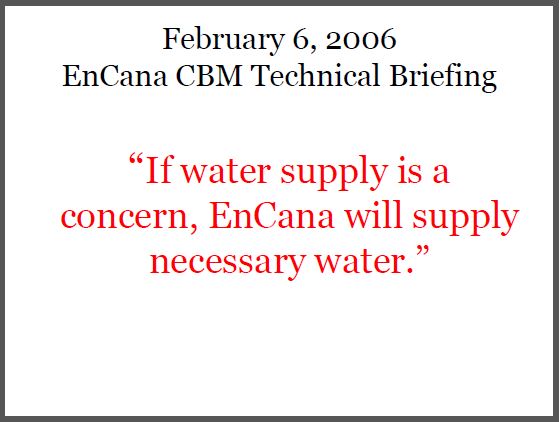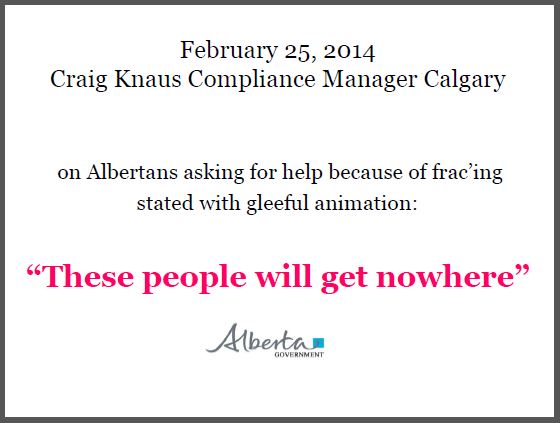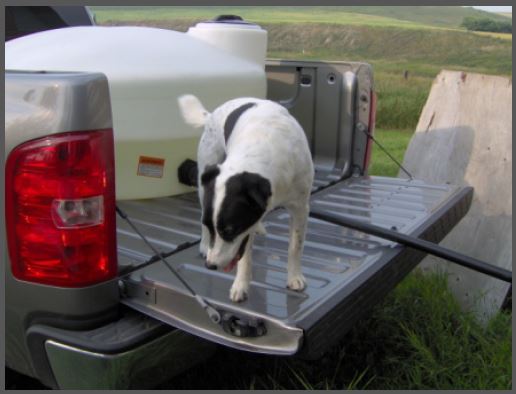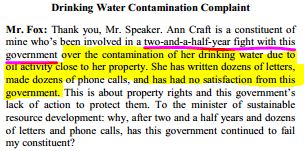Donegal Township families fight driller to get clean water by Kari Andren, September 17, 2014, Triblive News
From January to June, Ken and Mildred Geary had to use bottled water to cook, clean and shower because a leak from a gas drilling company’s pond contaminated their underground well water.
The state Department of Environmental Protection has ruled their well was contaminated by a nearby fracking operation.
Mildred Geary first noticed the tap water smelled rotten and felt slimy. [The Ernst water went slimy also, after Encana frac’d the aquifer that supplies her water well] Running hot water in the kitchen would fill the interior of their red brick ranch along Route 711 in Donegal Township with a horrible odor, she said.
The family complained to WPX Energy Appalachia LLC, which operates the nearby gas drilling well pad, and the company eventually agreed to supply them with cases of bottled water.
“It was a pain. We had to keep a big bottle of water handy all the time,” said Geary, 76. “We couldn’t shower or anything because we didn’t have decent water. We used the bottled water and just washed off.”
Since 2007, natural gas drilling has contaminated 243 wells in Pennsylvania, according to DEP.
The department has ordered the Tulsa-based company, which has an office in Canonsburg, to provide the Gearys and two other affected households with a permanent source of clean water, finding that “WPX is responsible for the pollution of the water supply” and failure to provide an alternate source constitutes “a public nuisance and unlawful conduct.”
The Gearys are the third family to receive a report from the state that their well water was contaminated by a leak in WPX’s impoundment, or surface-level water holding pond, on the Kalp well pad. The DEP ruled the impoundment contaminated the water of Joseph and Sonja Latin, who live next door to the Gearys, and of Ralph and Sonya Brown, who live on Montana Lane, a private drive off Williams Road.
The homeowners and WPX are battling on multiple fronts, including lawsuits in Westmoreland County Common Pleas Court and an appeal before the state Environmental Hearing Board.
In its appeal of the Latins’ ruling, WPX claims the water quality is “naturally resolving over time without the need for intervention or permanent replacement” and supplying bottled water “is adequate for the purposes served by the water supply.”
The company has until today to appeal DEP’s ruling on the Gearys’ water contamination to the hearing board.
“We want (each family) to have access to water in their house, turning on taps. … Nothing short of that is acceptable,” said John Poister, a DEP spokesman.
WPX refused to respond to specific questions from the Tribune-Review. It forwarded a statement prepared in July, in which spokeswoman Susan Oliver said the company is working with the families and the DEP, but contesting DEP’s test results on the water quality.
She claimed the company’s water tests show the Latins’ and Gearys’ water had “issues of odor, taste and visual appeal; (but) at no time were the families facing a health impact concern.”
…
In September 2012, the Browns’ water was found to be contaminated with various pollutants, including manganese and sodium, according to a lawsuit the couple filed in September 2013 against WPX and its subcontractors.
While humans need small amounts of manganese and sodium daily, studies show exposure to high levels of manganese can cause damage to the central nervous system in adults and can lead to cognitive impairment in children, who are more sensitive to the element, according to reports prepared for the federal government. Continued exposure to high levels of sodium can lead to high blood pressure, according to a report to the Environmental Protection Agency.
The Browns’ suit, which is pending, claims the contamination caused their property value to decrease while inflicting personal discomfort and annoyance. The Browns have been receiving water through an outdoor water tank supplied by WPX, according to the company.
The Latins filed a lawsuit against WPX and its subcontractors on Sept. 4. It claims that last year their water was contaminated with manganese. The suit makes similar claims regarding decreased property values and quality of life.
Attorneys representing the Browns and the Latins did not return calls and emails seeking comment.
COPING FOR THE MOMENT
For now, the Gearys have a large round water tank behind their house that connects to faucets and showers. The tank, in use since June, is filled weekly at WPX’s expense, at about $500 a week, said Dolly Coffman, a daughter who is helping the Gearys navigate the process of winning back clean water.
“That’s not a way of living,” Coffman said. “All they want is good water. It ain’t like they want a million dollars.”
Permanent outdoor water tanks are not an acceptable fix, Poister said.
Coffman said her family asked about tapping into public water provided by Indian Creek Valley Water Authority, about 1 mile up Route 711, but WPX said it would cost about $1 million to run the connection.
“We have city water in Donegal. We could bring that down and solve the problem for the whole neighborhood,” Mildred Geary said.
Authority manager Kerry Witt said WPX has not contacted him about extending the water lines.
Witt said he would need a specific distance from the authority’s closest water line, at the border of Donegal Township, to the families’ homes to provide a cost estimate, but it generally costs $60 to $70 per foot to extend a line along a state road such as Route 711.
That would amount to about $316,000 to $370,000 to extend the water line by 1 mile.
“It would be an expensive proposition,” Witt said. “If there was a necessity and a funding source to pay for the extension, we would (consider it).”
“An important thing to realize is that bottled water is not an answer,” Dr. Cynthia Walter, an associate professor of biology at St. Vincent College. Walter said. If people shower in contaminated water, “you end up breathing water droplets and any contamination in the water enters your lungs.” [Emphasis added]
[Refer also to:

Just another Encana lie.
Ernst has been hauling alternate water since 2008 when the Alberta government broke it’s legislature made promise to provide water “now and into the future.”

Slides from Ernst presentations


